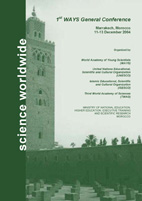 World
Academy of Young Scientists (WAYS) Last Month Held Its
Inaugural Meeting in Marrakech. (January 16, 2005)
World
Academy of Young Scientists (WAYS) Last Month Held Its
Inaugural Meeting in Marrakech. (January 16, 2005)
|
News & Views item - January 2005 |
![]()
 World
Academy of Young Scientists (WAYS) Last Month Held Its
Inaugural Meeting in Marrakech. (January 16, 2005)
World
Academy of Young Scientists (WAYS) Last Month Held Its
Inaugural Meeting in Marrakech. (January 16, 2005)
On January 17, 2001 ANU Professor Emeritus Adrian Gibbs contributed one of TFW's first opinion pieces, Australia’s Creative Generation Must be Allowed to Influence Decisions. Four years have passed and perhaps as no surprise there is little indication that Professor Gibbs' admonition:
There are two crucially important and related aspects of the current Australian science scene that have not attracted enough attention. First, whether the current treatment of Australia's young scientists is optimal for the future of science in this nation, and secondly whether innovation is optimally fostered by the present system that controls publicly funded research.
Now exactly three years eleven months later around 150 researchers and observers from 85 countries made it to the inaugural 3-day meeting on 13 December of World Academy of Young Scientists (WAYS), the first body to represent young researchers of all disciplines. The United Nations Educational, Scientific and Cultural Organization (UNESCO), provided most of the meeting's funding.
Quirin Schiermeier covered the the event for Nature who reports that the group's primary goal, according to Gaell Mainguy, a French developmental biologist and the first president of WAYS, is to strengthen the voice of students and young researchers in both science and science-policy discussions at the global level. And Thomas Rosswall, executive director of the umbrella organisation International Council for Science says bluntly, "At any given academy meeting anywhere on the globe you see grey-haired men speaking to other grey-haired men. We would appreciate a partnership, through WAYS, with the next generation of scientists. We need their inspiration."
But it's very early days yet for the new organisation. "WAYS's projects have yet to take shape. Meeting attendees were too busy hammering out an institutional framework to figure out what the group should actually do once it gets going. Candidate projects include the creation of a journal specifically for young scientists; training programmes to help people write their research papers; free online access to scientific literature; and a database of groups to help set up collaborations with young scientists from disadvantaged countries." Publicly, at least, nothing has been said as to how to rattle the cages of the establishment's "grey heads" to give the young minds a fair hearing and some real creative width.
So far, however, the ambitions of
most of the young scientists in Marrakech were, well, mundane. "I hope to get
access to other labs and meet people interested in my field," Nermeen Youssef, a
21-year-old hepatitis researcher at the University of Cairo, told Schiermeier.
WAYS's success in overcoming cultural barriers in science, and becoming a global
mouthpiece for the younger generation of researchers, will be evaluated by its
audit committee before the next meeting in 2006.
Currently what seems to be lacking in WAYS can be partly summed up in its current failure to boldly address what Adrian Gibbs points out needs doing in Australia:
Australia's future research effort depends on the efforts and the innovativeness of its young scientists, yet most submissions to review committee’s seem to come from established persons or their organisations - the young, who do much of the work, and probably produce many / most of the innovative ideas seem not to contribute, perhaps because they have neither the infra-structural support, nor the time, to contribute to the science reviewing / planning process.
While more funding for research is essential, I do not believe there is great value to be gained from just putting it into the existing system. Australia needs an in-depth study of the structure of its science 'industry' to devise new ways that will foster the career and skill building of younger scientists, foster innovation, expose established scientists to selection based on their ability to do good science, not just build networks. There are lots of ways in which this could be achieved by small modifications of the existing system, and by diminishing the influence of those described by Prof Barry Ninham as the bureausaurs.